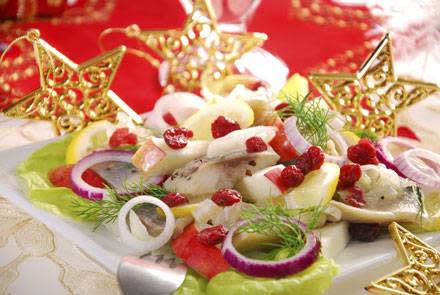Healthier Christmas dinners

Turkey, fish and other meat
If you’re having poultry as your main course, then stick to the white breast meat, which contains less fat than the browner meat. Flavour it with herbs and lemon juice and cut down on salt when you season it.
Choose turkey over more fatty birds such as goose or duck.
Tempting as it might be, avoid eating bits of crispy turkey skin, as the skin is the fattiest part of any bird.
Try having a fish-based starter. The protein in the fish will help fill you up so that you are less likely to overindulge on other courses. White fish is low in fat, while oily fish is packed with omega-3 oils – which are anti-inflammatory and will help to keep your heart healthy.
Avoid chipolatas wrapped in bacon. As well as saturated fat, these contain a lot of salt.
Vegetables
Load up half your plate with veg, so that this makes up a good proportion of your meal. Try honeyed carrots, braised red cabbage and traditional Brussels sprouts for betacarotene, isothiocyanate compounds (which may help fight cancer), and fiber. Remember: the more colourful your plate, the more varied your range of health-giving nutrients will be.
Opt for boiled instead of roast potatoes.
Pudding and cheeses
Use skimmed milk to make custard as an accompaniment to your pudding, rather than using cream, ice cream or brandy butter. This will provide you with calcium while avoiding the extra fat found in the heavier options.
Try a fruit platter for dessert in place of a pudding in order to cleanse your palate and provide vitamins, minerals and antioxidants.
A boozy fruit compote with half-fat crème fraiche would make a healthy yet decadent sweet. Try plums, berries, apples and sultanas stewed in red wine, vanilla and a little bit of sugar.
Pile up your cheese-board with strong-tasting cheese, as you will be satisfied with smaller amounts. Eat the cheese with crumbly oatcakes, celery and grapes for a dose of soluble fiber (which helps to reduce cholesterol), B vitamins and antioxidant flavonoid compounds (which help to keep the heart healthy).
Snacks
If you’re tempted to nibble while waiting for dinner to cook, try crunchy vegetable crudités such as cucumber, pepper and carrot, along with a yogurt, garlic and mint dip; hummus; or fresh tomato salsa with onion, garlic, a pinch of salt and some coriander.
Make the most of the festive season’s satsumas (for vitamin C) and nuts (for healthy oils), and steer clear of the cheap milk chocolates that abound!
If you simply have to have chocolate, opt for the dark variety, which has a higher proportion of flavonoids than milk.
Drinks
Drink plenty of non-alcoholic liquid throughout the day. This will stop you mistaking thirst for hunger, as well as dilute your alcohol intake, dampen your appetite and help to ‘lubricate’ your food – which is particularly important when eating fiber.
Avoid alcohol before eating. Drinking alcohol on an empty stomach will speed up its entry into your bloodstream, and also act as appetite stimulant which may encourage you to overeat.
Feel free to enjoy a guilt-free glass of red wine with your meal, as alcohol increases iron absorption.
And a final tip…
Go for a brisk walk when you get a chance. This will boost your metabolism in preparation for the next feast!
Read more on realbuzz.com...
Health benefits of a Christmas dinner
Top 10 ways to eat and drink healthily at Christmas
Follow realbuzz on Twitter


